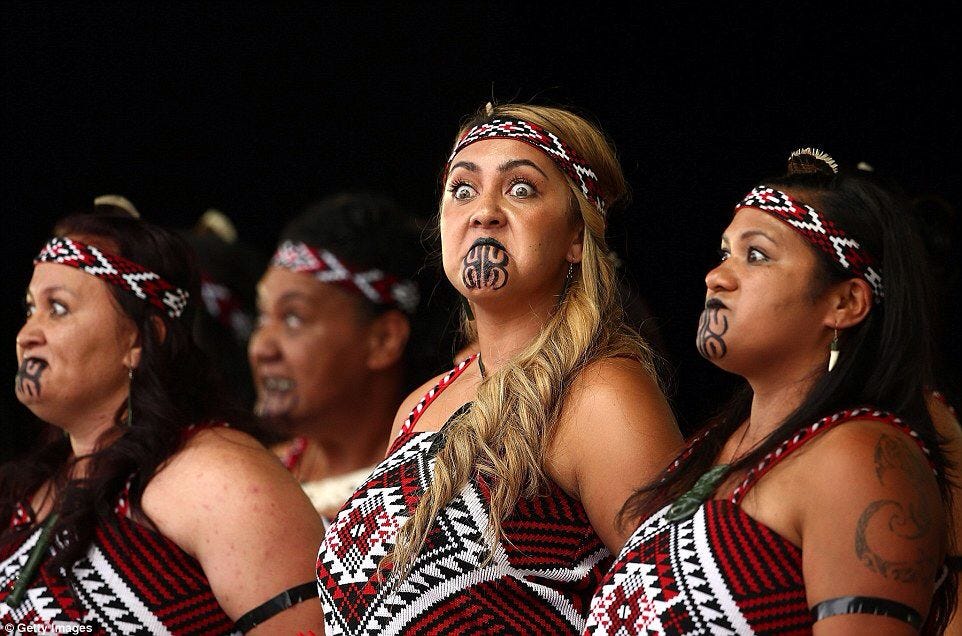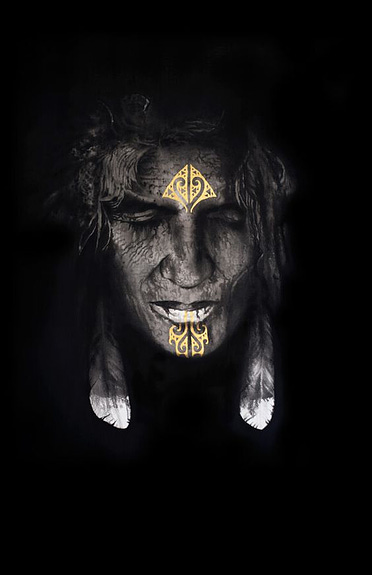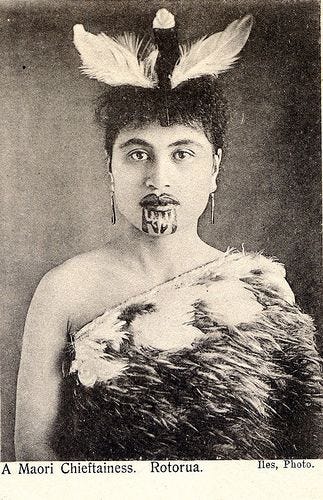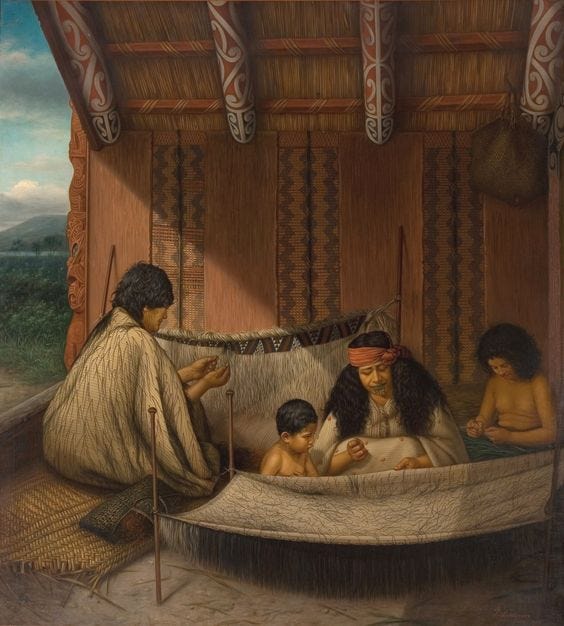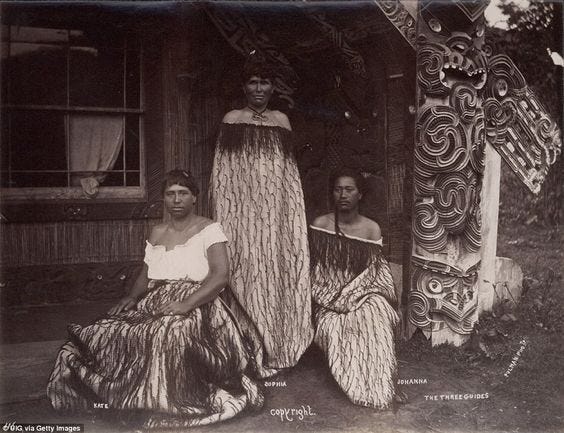01 - MANA WĀHINE TOA - The Goddess, warriors, and Mothers
Today’s pickings 01 - MANA WĀHINE TOA - The Goddess, warriors, and MothersEnter the world of Wāhine Māori, who were once born with Mana which was forcefully torn away from themDear Readers, To help you understand the context of today’s essay, you can read the detailed introductory post here. Also, since the nature of the post is intense, I have split the article into a two-chapter mini-series. The last thing I want is for you to be fatigued while reading Berkana. Let us sway together in and out of stories, myths, history, and socio-political constructs to understand the power and pain of our sisters from Oceania.
Te Whare TāngataThe only correct way to understand the role of women in the Māori culture is through the traditional Māori worldview. The concept of universal balance is prevalent throughout the Māori cultural belief system. Men and women were considered equally important as they together constitute the spirit of their whakapapa (genealogy). They were considered to be a part of the collective and as individuals with their distinctive mana (values). Everyone was made accountable for their actions towards their whanau and iwi. Every Māori child was raised to understand the complexity of their interrelationship with their community and the disgrace they will bring if they break the law of the natural order of things. The Māori language is the strongest reference point to assure us about their collective world thinking and egalitarian values. The Maori language has a unique way with its pronouns. Both the third person singular personal pronoun (ia) and the possessive personal pronoun (tana/tona) are gender-neutral. Māori names are often gender-neutral as well. The proverbial acknowledgment of women is apparent in phrases like Whare Tāngata ‘house of humanity’ used to describe women. In Māori culture, women were considered sacred and important. They were said to be the descendants of the great ancestress Papatuanuku (mother earth), who was revered for her ability to give birth and nurture. Māori Pantheon/Cosmology - Atua Wāhine
The representation of women in the Māori cosmology is central to Māori ideologies. Although the colonial lenses remained heavily distorted and deliberately misinterpreted their roles as passive 'old crones', who existed solely to enable the Atua Tāne (male-gods). The white supremacist and misogynistic viewpoint like that of anthropologist Elsdon Best are intentionally aimed at degrading the importance of Atua Wāhine (female gods) resulting in a biased perception of the Māori pantheon. This explains the narrative of the tale of the Demi-god Maui-tikitiki-a-Taranga becoming existentially central to Māori culture post-colonialism. The significant women who enabled Maui’s journey were often overlooked. Like that of his grandmother Mahuika (deity of fire), whose fingertip he stole to bring a gift of fire to humanity. She also gave him her jawbone to fish up the North Island and slow down the sun. And then there was the legend of Hine-nui-te-po (goddess of death), who defeated Maui in his quest to attain immortality. Social and Political rolesThe Wāhine were considered sacred for their power of the womb. Although, they were neither limited nor constrained to their roles of nurturer. They commanded their leadership prowess as landowners, spiritual and political leaders, fighters, and navigators. They commanded the voyages in the sea as oracles and visionaries. Their connection with their mana helped them guide the social conduct of their clan. The Māori female elders were considered to be repositories of sacred knowledge. They held discourses in whare tūpuna (community centers) and schools, while their European counterparts were prohibited from attending schools. Even in their primitive old-world system, they were much progressive and receptive towards their wāhine. Liberal thinking was prevalent in Māori customary traditions and practices. Women were not considered possessions by her whanau. They could retain their names after marriage, and their children were free to identify with either side (mother’s or father’s) of their kinship. Paternity was not enforced upon men. Conceiving babies and childbearing was not a sin but a normal part of living in association with the natural world. The Māori men were subjugated to much humiliation or alienation on abusing their partner. They were treated as unholy for damaging their mana, in most cases beyond revival. Abusing one's spouse and children was considered a serious crime that entailed dire consequences. He was not a king or a lord of his home like his western counterparts. Any incident of abuse of women and children was taken seriously by her whanau. Immediate actions were taken to impede the abuser from causing further damage. He would be disowned by his iwi, as he destroyed his mana through the act of violence against his kin. The sanctity of marriage was considered in high regard where both the man and the woman were bind in a lifelong association of mutual respect. Stephanie Milroy, a Māori land court judge once stated,
It was obvious that in such circumstances women could rely on their whanau for protection. Her children were taken care of by her entire community including, her mother, grandmother, aunts, and other village elders. In the absence of a nuclear family model, the women were not left alone or at mercy of their partners for child-rearing or financial support. Reliability on the whanau gave the women affirmation of support. The whanau in true essence was a woman’s primary safe space. The multiple caregivers enable the woman to step out of the domain of house into the world to engage in leadership roles. The Māori culture like many other indigenous cultures uses the oral form of knowledge transfer from one generation to another. Most of the traditions are handed down through performance art, storytelling, poetry, and proverbial teachings (including Waiata, haka, and whakatauki). Many of these waiata (Maori song) composers were prolific women writers. Nga Moteatea is one such original anthological body of work. It hosts rich knowledge of the Māori iwi history and their connection to their whakapapa. Iwi history in these oral recollections always seems to feature women in varied roles as military, spiritual, and political leaders. Kuni Jenkins, a professor with Te Whare Wānanga o Awanuiārangi where she teaches and conducts research, mentions many such dominant stories of Māori women who are still inspiring young Māori blood. One such forgotten legend is that of Te Ao-kapurangi (18th century), daughter of one of Te Arawa’s chiefs. She was a woman of mana. She displayed her courage by dispelled the grimace of war by challenging the Hongi (chief) of the Ngāpuhi tribe and winning against him using sheer wit. Another descendent of the Te Arawa canoe known as Heni Pore of Te Arawa, around the 1860s fought fiercely against the British troops. She later became a member of the Women's Christian Temperance Union. Throughout her life, she was actively involved in many lands and social reform movements.
The Influence of Colonialism
As soon as the first settlers arrived in the island nations, everything slowly started to change for the Māori women. Their place in the Māori world became lesser and lesser significant. They were subdued, restrained, and morally obliged to serve the patriarchs. The misogynistic white patriarchal laws sealed the fate of Wāhine with derision and exploitation. The wild untethered spirit of the Atua Wāhine, that all wāhine māori embodied, was labeled as uncivilized or vulgar. Their formidable spirit was crushed under the weight of change enforced on them by the missionary way of life. Back then the English law entailed wife and children as possessions of the husband/father. As head of the family, the man had rights of life and death over his family members which were fundamentally at odds with the Māori whanau ideologies. The English common law stated: "the husband/father was head of household and thus in control; women and children were chattels to be used and abused by the paterfamilias as he chose”. Her rights to own property were also stomped over in alignment with the newly introduced law. She was left at the mercy of her father or husband, degraded to a position of a second-class citizen. The ownership of her children also belonged to her husband. Women were prohibited by the law to demand separation of any kind from their husbands. During the Treaty of Waitangi, the representatives of the Empire had to face the women leaders of the community. Back then, the idea of women chief was almost incomprehensible to the representatives of the crown. They specifically demanded that the men should sign the treaty and the women were discouraged from such participation. Here, I can state without flinching that this was not the first time that the spokesmen of the Empire were intimidated by a bunch of strong women chiefs. India records a similar history. When the East India company officials encountered the warrior queens of different regions, they retorted hostility towards her. They often refused to talk or settle any political matters with the women of color since their superiority complex ran deep. However, Indian Queens like Wāhine Māori chiefs had too much ferocity in them. Their voices couldn’t be unheard, their gaze couldn’t be ignored. The colonizers expected to be treated with obedience and conservatism while meeting a woman of color from colonies. I am sure they were shocked when being confronted by those subversive feminine archetypes. I think the native ancestors in their heavenly realms, roared with laughter when that must have happened. The Damage of the Whanau
Colonial oppression happened twofold - first by destroying the old world laws and establishing Christian laws where Māori women were conditioned systematically to become subservient and dutiful wives. However, the gender-neutral Maori language made it hard to establish the law. Therefore, slowly the Pākehā (white settlers) enforced their language too. Children were flogged in schools for speaking in the Māori language. The second was by establishing a beauty standard for the wāhine that is synonymous with their European counterparts. Getting a Moko kauae (traditional female chin tattoos) was treated as a crime. The visual art form of Tā moko was prohibited. It was particularly damaging because Moko is the only direct connection that Māori people shared with their whanau. They got dragged away from their whakapapa, and that was possibly the deepest pain inflicted by colonialism on the Māori people. Since their traditions lived orally and through various performance and visual art forms, a complete ban on such practices would mean a philosophical death of the culture. It was in the true sense, a heinous crime to separate someone from their center of sacredness. It was a form of slavery. The women and their children were eventually imprisoned in these ideological prisons, cracking open the soul of the land and pouring poison into it. Without the marks of their whakapapa, the people felt lost. They were alone and afraid in the world of Pākehā with nothing to turn to but violence and abuse. The dangers surrounding the loss of culture can be unsettling. When you take away from people their identities, they would turn into their shadow selves. This is dangerous both for the individual and the community. And that is what eventually happened. The circumstances of abuse, violence, and delinquency became the norm. Like the motif of the snake eating its tail, the violence ran in vicious infinite loops. This endemic suffering initiated by colonial conditioning is still integrated deep within the psyche of the Māori people. Coming weekIn the next chapter, we will dive deeper into the literature and movies made juxtaposing settlers to the Māori. We will recap the grueling past of the wāhine under colonialism. We will also look deeper into the revival of Moko kauae, learn about the intricate ancestral patterns and understand how their other Polynesian and Melanesian cousins have integrated the visual art form into their lives. We will also glide over the performing art of Kapa Haka and powhiri, listen to our sisters singing Karanga, and the soul-touching tradition of Hongi. We will complete a full circle and land inside the task of healing from the generation trauma undertaken by the modern wāhine. We will finally establish a deep sense of solidarity for our Māori sisters and their whanau, thus transforming ourselves through their stories. Stay tuned for Chapter 2Disclaimer: I am self-taught in culture and other related subjects. I do not belong to the Māori community but am highly interested in their culture and have deep respect for it. I apologize in advance for any misalignment in the interpretation or language use. If you find any such errors, you can kindly point it out to me in a private message and I will accommodate the changes immediately. Newsletter Recommendation of the week: Modern life demands too much energy and attention. In midst of all chaos, we tend to forget to come back to our center and recognize the importance of balance. One such space that reminds me of bringing me back to my center is Rufat Rassulov’s bi-weekly newsletter That’s Philosophical In Rufat’s own words : The modern world is a mess. That’s Philosophical helps its readers become more mindful of their noisy lives. Get inspirational insights every week and allow your mind to relax! Go give him a read! If you like the work I am doing at Berkana, you can support me by sharing this post with like-minded people. |
Older messages
MANA WĀHINE TOA - A Prologue
Wednesday, September 22, 2021
Stories of the sacred warrior feminine from the islands of Oceania
The Nature of Creativity
Sunday, September 12, 2021
Thank you for being on this journey with me
Welcome to Berkana!
Tuesday, September 7, 2021
Thank you for signing up for Berkana
You Might Also Like
• Book Promo Super Package • FB Groups • Email Newsletter • Tweets • Pins
Wednesday, January 1, 2025
Newsletter & social media ads for books. Enable Images to See This "ContentMo is at the top of my promotions list because I always see a spike in sales when I run one of their promotions. The
BUMP doors closing
Tuesday, December 31, 2024
Super quick reminder → the Copywriting Course New Year's deal is going away tonight in a few hours… 50% off an entire year (Plus 2 extra months). That's 14 total months of training and
🤝 Why Smart Biz Buyers Love the Holidays
Tuesday, December 31, 2024
3 ways the holidays are your huge opportunity. Plus: 1 incredible biz buyer story Biz Buyers, Welcome to Main Street Minute — where we share some of the best stories and ideas from inside our
Reading Atomic Habits to start the new year? Here's a free bonus
Tuesday, December 31, 2024
Happy New Year! Let's kick off 2025 with some free bonuses. Atomic Habits is currently on sale for up to 49% off and many people are reading (or re-reading) the book to start the year. This was
eBook Giveaway • Enter for a Chance to Win !
Tuesday, December 31, 2024
eBook Giveaway from Tony Faso eBook Giveaway Enter to win via King Sumo! Hi there, Exciting news!
Six Art World Predictions for 2025
Tuesday, December 31, 2024
Your weekly 5-minute read with timeless ideas on art and creativity intersecting with business and life͏ ͏ ͏ ͏ ͏ ͏ ͏ ͏ ͏ ͏ ͏ ͏ ͏ ͏ ͏ ͏ ͏ ͏ ͏ ͏ ͏ ͏ ͏ ͏ ͏ ͏ ͏ ͏ ͏ ͏ ͏ ͏ ͏
The Kids' TV Host Who Was Put in Time Out
Tuesday, December 31, 2024
Why you shouldn't make people work on holidays?
🧙♂️ Let's burn the "brand deal rules" in 2025
Tuesday, December 31, 2024
Because those "rules" are costing you thousands... ͏ ͏ ͏ ͏ ͏ ͏ ͏ ͏ ͏ ͏ ͏ ͏ ͏ ͏ ͏ ͏ ͏ ͏ ͏ ͏ ͏ ͏ ͏ ͏ ͏ ͏ ͏ ͏ ͏ ͏ ͏ ͏ ͏ ͏ ͏ ͏ ͏ ͏ ͏ ͏ ͏ ͏ ͏ ͏ ͏ ͏ ͏ ͏ ͏ ͏ ͏ ͏ ͏ ͏ ͏ ͏ ͏ ͏ ͏ ͏ ͏ ͏ ͏ ͏ ͏ ͏ ͏ ͏ ͏ ͏
200+ New Years Goals
Tuesday, December 31, 2024
We asked what people plan to do in 2025, here were the most common answers: Here's the detailed list of goals: In 2025 most people wanted to build: #1.) Build or scale a business #2.)
For Authors: Audio Book Promos 🔊 Tweets & FB group posts • 60 Day orders save 15% +
Tuesday, December 31, 2024
Affordable Audio Book Promos See what authors are saying about ContentMo Enable Images Audiobook
